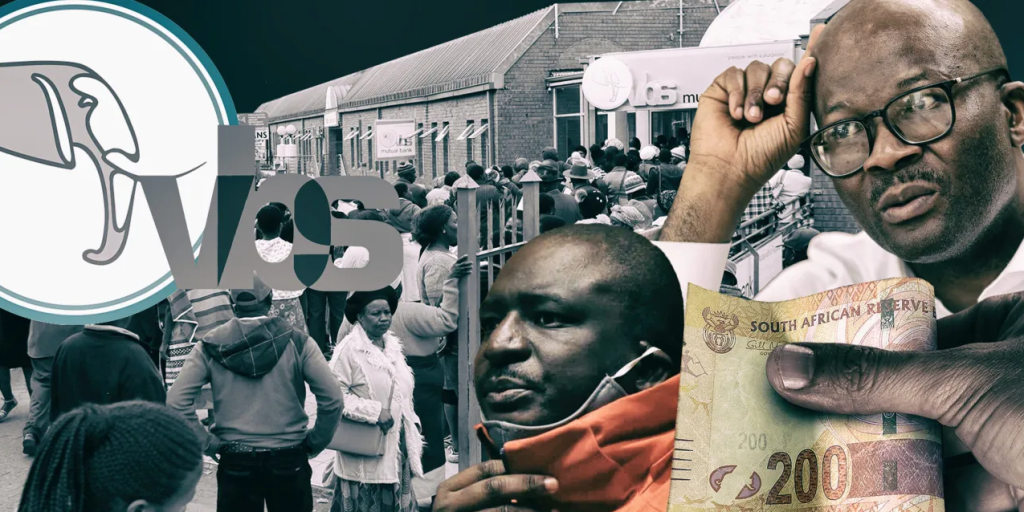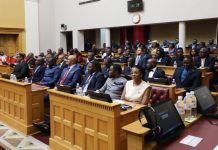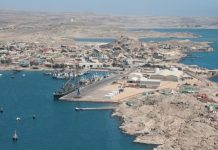17 July 2024
By Daily Maverick
Illustrative image, from left: VBS Mutual bank customers form long queues outside the bank in Thohoyandou, Limpopo, demanding their money. (Photo: Antonio Muchave / Sowetan) | VBS logo. (Photo: Supplied) | Former VBS Mutual Bank chair Tshifhiwa Matodzi. (Photo: Gallo images) | Former South African National Treasury director-general Dondo Mogajane. (Photo: Dwayne Senior / Bloomberg via Getty Images) | South African banknotes. (Photo: Adobestock)
The disgraced former chairperson of VBS Mutual Bank alleges that Dondo Mogajane, when director-general of the National Treasury, was bribed in a bid to save the collapsing bank. Moreover, the ‘bribe’ was paid through a non-profit controlled by the daughters of a minister. Mogajane has denied the claim, but has avoided responding to key details, citing constraints due to his cooperation with a Hawks investigation.
In August 2017, VBS Mutual Bank was dealt a blow that would, a few months down the line, prove to be fatal.
The bank had run on illegal multimillion-rand deposits from municipalities, with increasing sums of this money being diverted to the pockets of a wide variety of characters. These included the bank’s management, municipal employees, “commission agents” liaising with the municipalities and political power brokers.
As with any Ponzi scheme, municipal depositors could only be paid back their cash once even more municipalities deposited money. If the deposits ever stopped, the house of cards would collapse.
That is what started happening in August 2017, when the National Treasury sent a letter to municipalities instructing them to withdraw their funds from VBS and forbidding them from making any additional deposits.
Legally speaking, municipalities were only allowed to make deposits at traditional banks, meaning deposits into a mutual bank like VBS were illegal from the start.
The Treasury’s belated intervention rapidly became an existential threat to VBS.
As soon as the municipalities received the marching order, VBS rushed to court to challenge the instruction — a long shot that was ultimately abandoned.
However, a tell-all affidavit signed by former VBS chairperson Tshifhiwa Matodzi last week suggests that there was a Plan B when it came to the National Treasury.
Matodzi’s affidavit accompanies a plea deal struck with the National Prosecuting Authority in which the banker pleaded guilty to 33 charges, ranging from fraud and theft to money laundering and racketeering, for which he is to serve a 15-year prison sentence.
Among Matodzi’s revelations is that he paid a bribe to the then director-general of the National Treasury, Dondo Mogajane, in an attempt to, at the very least, stall the execution heralded by the August letter.
AmaBhungane has access to banking records collected by forensic investigators in the wake of VBS’s collapse. These confirm much of Matodzi’s story and, along with Matodzi’s confession, raise more questions.
Mr Clean
Mogajane, who is now the chief executive of the Moti Group of companies, was appointed director-general of the National Treasury in June 2017, two months before the fateful letter to municipalities.
This was the culmination of a long career at the institution, during which he was credited with being a bulwark against the forces of State Capture — a veritable Mr Clean.
If Matodzi’s affidavit is to be believed, however, it did not take long before Mogajane indicated, at the very least, a willingness to abuse his office.
Mogajane, for his part, has strongly denied taking money but has not engaged with the details of Matodzi’s claims.
Matodzi said he met Mogajane at least five times. The first three meetings were seemingly unofficial: at a cigar lounge, the VBS offices and then at Eagle Canyon, the golf estate where Matodzi lived.
The affidavit avoids giving dates for the first two meetings, although they ostensibly occurred between August and October 2017.
This avoidance is probably because the alleged point of the meetings was to deal with the August letter. The third meeting, for which Matodzi does give a date, allegedly occurred on 8 October.
The affidavit nonetheless focuses on the first meeting, which Matodzi says occurred at the PedroPortia Cigar Lounge in Fourways. The venue is appropriate for what comes across as a conspiratorial get-together in a smoke-filled room.
Banking records suggest that this meeting occurred on 23 September 2017. On that day, one of the VBS accounts under Matodzi’s control paid a R2,485 bill at the cigar lounge.
According to Matodzi, the meeting was between him, Mogajane, a VBS fixer named Ralliom Razwinane and an otherwise unidentified man called “Chuma”. We could not reach Razwinane, who is one of the VBS accused.
Allegedly also present was one “Dr Mkhize”.
The latter was, by all indications, Philile Mkhize — a medical doctor and the daughter of the late deputy minister in the Presidency, Hlengiwe Mkhize.
We’ll get to that shortly.
The topic of discussion was the National Treasury’s instruction to municipalities. According to Matodzi, Razwinane whispered in his ear that he needed to pay Mogajane R1-million.
Razwinane then allegedly whispered in Mogajane’s ear and the latter nodded his head. Mkhize subsequently gave Razwinane a piece of paper on which was written banking details. Matodzi says he then asked whether this was where he should deposit the R1-million, in response to which, he claims, Mogajane again nodded.
“The payment was intended for Dondo to intervene and to facilitate the withdrawal of the National Treasury letter and to grant VBS the special dispensation of 18 months for it to continue to accept the Municipal investments,” Matodzi claims in his affidavit.
At VBS, the hope had been that a large breather like this would allow it to reel in new big-fish depositors, specifically state-owned enterprises, and maybe even to convert into a registered bank.
The banking details shared in this secretive exchange, however, belonged not to Mogajane but to a non-profit company named Baphilile Foundation.
‘Never heard of it’
The Baphilile Foundation has three directors. Two of these are the daughters of the late deputy minister Mkhize: Philile Mkhize and Londiwe Mavundla. It is the younger Mkhize, Philile, who was at the alleged meeting with Mogajane and who, according to Matodzi, was in charge of Baphilile.
Mkhize told us that she couldn’t discuss the issue, but insisted that Baphilile was a real non-profit company doing work in the field of women’s health.
Baphilile has no discernible online presence and is not registered on the NPO portal of the Department of Social Development, although such registration is not compulsory.
Mkhize’s sister and co-director Londiwe Mavundla could not be contacted.
The more interesting case is possibly that of the third director, Phemelo Tshoeu, also a medical doctor.
Tshoeu told us she had never heard of Baphilile and was shocked to see her name on the company records we showed her.
“I was not even aware I am a director in this company. I studied at university with Dr Mkhize, and she would have easily had a record of my ID number because we previously (about 10 years ago) travelled to the UK together. And they did the flight bookings. But I am still shocked that they would have used my name falsely in this manner,” she told us via WhatsApp.
In amaBhungane’s experience, it is effortless to appoint someone as the director of a company without their knowledge, so Tshoeu’s story is at least possible.
Payments
Irrespective of who held the reins, banking records from forensic investigations into the affairs of VBS show that Baphilile received not one, but two payments from VBS accounts.
The first was on 2 November 2017, some three weeks after Matodzi’s third alleged meeting with Mogajane, when R100,000 was paid to the foundation by Robvet — a company described by Matodzi in his affidavit as a slush fund for, among other things, payment of agent “commissions”.
VBS was by now trapped in a downward spiral, scrambling to keep municipal deposits while also pursuing another hoped-for white knight in the shape of the Passenger Rail Agency of South Africa (Prasa), from which it was negotiating a lifesaving R1-billion deposit.
That negotiation was also steeped in alleged backroom dealings, with the CEO of Prasa, Cromet Molepo, according to Matodzi, asking for a R50-million bribe to secure an eventual R5-billion in deposits from the state-owned company. (Molepo told us this was a “blue lie”, but more on that later.)
This investment never came to pass, not least due to an exposé by the Sunday Times.
Here is where the timeline gets important.
Forensic banking records show a second payment to Baphilile, this time for the touted R1-million, was made on 22 February 2018.
An annexure to Matodzi’s affidavit, however, seems to show the payment being made on 5 February — a contradiction that is hard to explain since both dates are seemingly system-generated.
The investigators’ date (22 February), however, fits events as it came in the middle of an intense period of negotiation and pleading with the SA Reserve Bank and National Treasury after it became clear that VBS was teetering on the precipice and its depositors were in danger.
On 22 February, the day the investigators’ data say the R1-million was paid, a letter was sent to the then minister of finance, Malusi Gigaba, by the registrar of banks, Kuben Naidoo, wherein he raised the alarm and stated that his office “will be obliged to consider invoking appropriate actions within its mandate in order to protect depositors’ funds”.
Both Mogajane and his deputy, Ismail Momoniat, were CC’d.
(Gigaba was removed a week later in Cyril Ramaphosa’s clean-up of the Zuma Cabinet following Ramaphosa’s election as ANC president the preceding December and takeover of State presidency in 15 February 2018.)
On 8 March, a meeting was held at the SA Reserve Bank’s headquarters at the behest of Naidoo. The entire management of VBS was present and Mogajane represented the National Treasury.
On the agenda was the SA Reserve Bank’s intention to, later that day, recommend to the newly appointed minister of finance Nhlanhla Nene that he put VBS under curatorship. VBS was broke and no one denied it. However, Matodzi begged to be given one more day, as the Public Investment Corporation’s (PIC) investment committee was supposedly meeting the next day to decide whether to grant VBS an astonishingly generous lifeline of R1.5-billion.
Mogajane was very much in VBS’s corner, as attested to by the minutes of the meeting:
“Dondo had noted the upcoming meeting to be held by the PIC’s Investment Committee on Friday 9 March 2018, which indicated a possible commitment by the shareholder to find a viable solution to VBS’s immediate liquidity shortage. He further suggested that the recommendation to place VBS under curatorship be postponed until such time that the aforementioned meeting had taken place.”
The motion carried the day, but the PIC funds did not materialise.
On 10 March, Mogajane belatedly co-signed a letter to Nene recommending that the bank be placed under curatorship. The letter had already been signed by Naidoo and Mogajane’s deputy, Momoniat, two days previously.
Mogajane made a handwritten note on the letter reading:
“Minister, I recommend that you approve the request of the registrar as the Tax Policy division has been engaging with the office of the registrar and believe your approval is in the best interest of depositors and to try and save the bank.”
Ultimately, if Mogajane was bribed it did not achieve much for VBS and there is little evidence that he made strenuous efforts on the corrupt bank’s behalf.
In a statement released last week, Mogajane counter-attacked, saying: “I was one of the people who stopped Matodzi in his tracks.”
He did not deny the private meetings with Matodzi but rather complained that “Matodzi’s affidavit conveniently excludes the many meetings held in the presence of other people, including with VBS management, the Public Investment Corporation (PIC) as a VBS shareholder, the South African Reserve Bank (SARB) and other Treasury representatives”.
Matodzi’s affidavit does in fact only mention two such formal meetings.
“I categorically deny that I have ever received corrupt monies or bribes … my record is clean in terms of how I ran my department and conducted myself as a member of National Treasury,” said Mogajane.
The Treasury, for its part, has said in its statement that the allegations have not yet been tested in court.
However, Mogajane’s first meeting with Matodzi at the cigar lounge, if it indeed took place on 23 September 2017, would have occurred just over a month after VBS took the Treasury to court, making the private meeting arguably highly inappropriate.
Mogajane’s lawyers told us, “Our client stands by the contents of the public statement he issued last week. He denies any impropriety in his dealings with VBS Bank and/or Mr Matodzi.
“Our client is unfortunately constrained in providing detailed answers to your questions since he is cooperating with the Hawks in their investigations into matters linked to VBS and would not want to prejudice such investigations.
“Should the opportunity arise, our client will be more than happy to clarify the matters raised by you in your letter.”
Dr Dan
Matodzi’s affidavit also shed light on some lingering questions around VBS.
The PIC was central to the entire saga. It was not only a shareholder but also the primary funder of VBS through debt facilities and share subscriptions. The state-owned asset manager’s two deployees on the VBS board — Ernest Nesane and Paul Magula — were central to the fraud and were paid well for their trouble.
A forensic investigation conducted by the PIC in the aftermath of VBS’s collapse found that at least three other PIC officials had a hand in deals with the bank while also taking loans from it.
But there was always a question mark over Dan Matjila, the then CEO of the PIC, who has since disappeared into a fog of notoriety after intervening to secure Iqbal Survé’s AYO Technology Solutions a R4.3-billion PIC investment.
Matjila received a R2.4-million home loan from VBS, which itself could not be said to constitute a bribe.
By far the most serious allegation, however, related to R5-million in physical cash that Matodzi had allegedly personally delivered to a representative of the PIC.
VBS’s treasurer, Phophi Mukhodobwane, testified at the Mpati Commission of Inquiry, held in the aftermath of VBS’s demise, that he had withdrawn the cash at VBS’s Makhado branch and flown to the Lanseria airport in the company helicopter to give it to Matodzi, who was in turn to give it to “Dr Dan”, as Matjila is commonly known.
Banking data show that the sum was withdrawn on the relevant day and the teller informed one of VBS’s founders, Madambi Muvhulawa, who claims that he, in turn, alerted the PIC’s compromised VBS representative Nesane.
Now Matodzi, in his affidavit, has revealed that he had personally given the bag of money to none other than the same Nesane to “take care of certain influential people within PIC”, which Matodzi says Nesane assured him “several times” included Matjila.
The practicalities again recall a pulp novel, with Matodzi claiming he stashed the money in his car and then handed it over to Nesane the next day at an Engen garage. The day after, a facility VBS had been hoping for from the PIC was granted.
Matjila has denied under oath that he took a bribe to help bail out VBS. “The mere suggestion that I would accept a bribe is abhorrent to me,” he told the Mpati Commission.
Cromet Molepo
Matodzi said in his affidavit that around the critical early 2018 period, he received messages that his team had obtained a life-saving investment of R1-billion from Prasa, but this never materialised.
He said that high-profile ANC member and VBS fixer Kabelo Matsepe had organised a meeting between himself and Cromet Molepo (then Prasa’s acting CEO) at Matodzi’s residence in Eagle Canyon on 19 January 2018.
“At this meeting, Cromet promised Prasa to invest at least R5-billion in VBS in return for a R50-million gratification which was to be transferred to a foreign bank in Canada. No banking details were provided at the meeting or subsequent thereto.
“At the conclusion of the meeting, he then requested that I write to Prasa regarding the VBS investment proposal. I wrote a letter and sent it to him. I do not recall any further engagements with Cromet after our meeting as the relationship was being handled by Matsepe. The promised investment did not materialise, and no gratifications were paid,” said Matodzi.
While Molepo confirmed to amaBhungane that he had attended a meeting at Matodzi’s house, he vehemently denied Matodzi’s claim that he had requested a R50-million bribe or that he had promised to increase Prasa’s investment in VBS to R5-billion.
Molepo, who was appointed as acting CEO in the second week of December 2017, said he had many meetings with various individuals at that time and did not remember who invited him to the meeting with Matodzi and Matsepe.
“I did not know that it was a [meeting with] a service provider. I was just asked to come meet ‘someone who had something to discuss with me’.”
It was only when he arrived at Matodzi’s house that he learnt he was meeting with VBS representatives over Prasa’s pending investment with the mutual bank.
In November 2017, Molepo’s predecessor, Lindikhaya Zide, wrote a letter to VBS saying that Prasa would deposit R1-billion in VBS for a guaranteed interest rate of 8.5% per annum.
At the 2018 meeting, Molepo said Matodzi and Matsepe “confronted” him with that letter and accused him of being a “stumbling block” to the investment that Zide had approved.
Responding to the allegation that he had promised to increase the investment to R5-billion in exchange for a R50-million bribe that had to be paid into a foreign account in Canada, Molepo said this was a “blue lie”.
He confirmed that his wife and children were based in Canada at the time and that this “was not a secret”, saying any suggestion that the money would be sent to accounts held by them was false.
On 24 January 2018, VBS addressed a letter to Molepo recording that after a “fruitful and constructive” meeting between Molepo and Matodzi, VBS had approved an increased interest rate of 9.25%.
Molepo told amaBhungane that he never gave anyone a directive to make an investment in VBS, but documents from advocate Terry Motau’s initial report on VBS show that on the same day, Molepo forwarded VBS’s letter to the acting CFO, Yvonne Page, stating that he had “negotiated an improvement on the original proposal which [Prasa] had accepted” and “because of the strategic nature of the proposal in terms of transformation, kindly prepare a submission for approval by the nominee of the BOC”.
According to Motau, “Page did not do as Molepo had directed. Instead, she wrote back to him saying, ‘Please note where we are at the moment the investment cannot be made — as discussed, we will give you a full write-up’.
“She then informed the Treasury of the situation. The affair subsequently became public knowledge and Prasa did not proceed any further in the ensuing glare of publicity.”
Internal documents show that in December 2017, shortly after Molepo was appointed as acting CEO, Page submitted the finance department’s risk analysis explaining that investing in VBS would be unlawful and too risky.
Therefore, by the time that Molepo met with Matodzi in 2018 and told Page to make a submission to the board, including the newly “negotiated” interest rate, he was well aware of the issues around the VBS investment.






